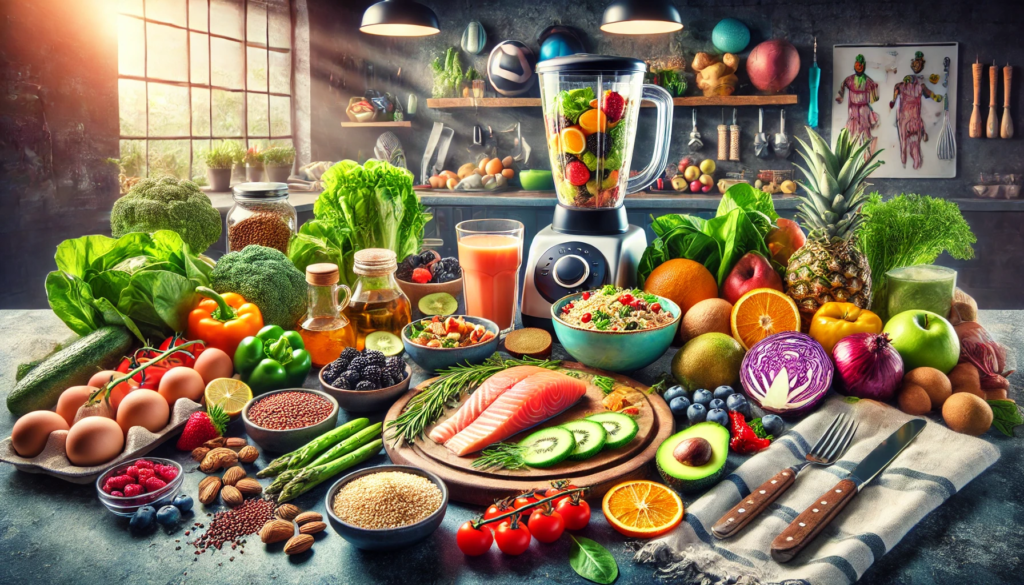Proper nutrition is crucial for athletes and active individuals to achieve peak performance, enhance recovery, and maintain overall health. A well-balanced diet tailored to the specific needs of an athlete can support endurance, strength, agility, and mental focus. In this article, we’ll explore essential nutrition tips and provide sample meal plans designed to optimize athletic performance. Whether you’re a professional athlete or a fitness enthusiast, these guidelines will help you fuel your body effectively and reach your training goals.
The Role of Nutrition in Athletic Performance
Nutrition plays a pivotal role in an athlete’s ability to train, perform, and recover. The right combination of macronutrients (carbohydrates, proteins, and fats) and micronutrients (vitamins and minerals) can enhance energy levels, support muscle repair, and reduce the risk of injury. Additionally, hydration is vital for maintaining fluid balance and preventing dehydration, which can impair physical and cognitive function.
Key Objectives of Sports Nutrition
- Energy Supply: Providing sufficient calories and nutrients to fuel workouts and competitions.
- Muscle Repair and Growth: Supporting the repair and growth of muscle tissues through adequate protein intake.
- Optimal Body Composition: Achieving and maintaining a healthy weight and body composition for specific sports.
- Recovery: Facilitating the body’s recovery processes after exercise to prevent fatigue and injury.
- Mental Focus: Ensuring adequate nutrient intake to support cognitive function and mental clarity.
Macronutrient Breakdown
A well-rounded diet for athletes should include a balance of macronutrients, each serving a specific purpose in supporting performance and recovery.
1. Carbohydrates
Carbohydrates are the primary energy source for high-intensity exercise. They are stored in the muscles and liver as glycogen, which is readily available during physical activity. Athletes should prioritize complex carbohydrates, such as whole grains, fruits, vegetables, and legumes, which provide sustained energy.
- Daily Intake: Athletes typically require 5-7 grams of carbohydrates per kilogram of body weight per day. For endurance athletes or those engaging in intense training, this can increase to 8-12 grams per kilogram.
- Pre-Exercise: Consuming carbohydrates before exercise helps to top up glycogen stores. A meal rich in complex carbs and moderate in protein is ideal.
- Post-Exercise: Replenishing glycogen stores after exercise is crucial for recovery. A carbohydrate-rich meal or snack should be consumed within 30 minutes to 2 hours post-exercise.
2. Proteins
Protein is essential for muscle repair, growth, and recovery. It also plays a role in immune function and the production of enzymes and hormones. High-quality protein sources include lean meats, poultry, fish, eggs, dairy products, legumes, nuts, and seeds.
- Daily Intake: The recommended daily intake of protein varies depending on the type and intensity of training. Generally, athletes should aim for 1.2 to 2.0 grams of protein per kilogram of body weight.
- Timing: Spread protein intake throughout the day, including a source of protein in every meal and snack. This supports continuous muscle protein synthesis.
3. Fats
Fats are a vital energy source, particularly during prolonged, low-intensity exercise. They also support cell membrane structure, hormone production, and the absorption of fat-soluble vitamins. Athletes should focus on consuming healthy fats, such as those found in avocados, nuts, seeds, olive oil, and fatty fish.
- Daily Intake: Fats should constitute about 20-35% of total daily caloric intake. Emphasize monounsaturated and polyunsaturated fats, and limit saturated and trans fats.
- Role in Diet: Healthy fats can help maintain energy levels and support overall health.
Micronutrients and Hydration
In addition to macronutrients, athletes require adequate intake of vitamins, minerals, and fluids to support their training and performance.
1. Key Micronutrients
- Iron: Essential for oxygen transport and energy metabolism. Iron-rich foods include red meat, poultry, fish, lentils, and fortified cereals.
- Calcium: Important for bone health and muscle contraction. Sources include dairy products, leafy greens, and fortified plant-based milks.
- Vitamin D: Supports bone health and immune function. Sources include sunlight, fatty fish, and fortified foods.
- Electrolytes: Sodium, potassium, magnesium, and chloride help maintain fluid balance and prevent muscle cramps. They can be found in fruits, vegetables, nuts, seeds, and electrolyte-enhanced beverages.
2. Hydration
Proper hydration is crucial for maintaining performance and preventing dehydration. Athletes should focus on drinking water throughout the day and pay attention to fluid intake before, during, and after exercise.
- Pre-Exercise Hydration: Drink 500-600 ml (17-20 oz) of water 2-3 hours before exercise and an additional 200-300 ml (7-10 oz) 20-30 minutes before starting.
- During Exercise: Drink 200-300 ml (7-10 oz) of water every 10-20 minutes during exercise. For activities longer than 60 minutes, consider a sports drink containing electrolytes and carbohydrates.
- Post-Exercise Hydration: Rehydrate after exercise by drinking fluids equivalent to 1.5 times the amount of fluid lost during exercise. For every kilogram (2.2 lbs) lost, drink 1.5 liters (50 oz) of fluid.
Meal Timing and Nutrient Timing
Timing of meals and nutrient intake can significantly impact athletic performance and recovery. Athletes should consider the following strategies:
1. Pre-Workout Nutrition
Eating a balanced meal or snack before exercise can provide the necessary energy and nutrients to optimize performance. Aim for a meal rich in carbohydrates and moderate in protein, with low fat and fiber content to avoid gastrointestinal discomfort.
- Timing: Consume a pre-workout meal 3-4 hours before exercise. A smaller snack can be consumed 30-60 minutes before exercise.
- Examples: A bowl of oatmeal with fruit and nuts, a turkey sandwich on whole-grain bread, or a banana with a small amount of peanut butter.
2. During Exercise Nutrition
For endurance activities lasting longer than 60 minutes, consider consuming carbohydrates during exercise to maintain energy levels. Sports drinks, gels, and energy bars are convenient options.
- Timing: Aim for 30-60 grams of carbohydrates per hour, depending on the intensity and duration of the activity.
- Examples: A sports drink, an energy gel, or a small banana.
3. Post-Workout Nutrition
The post-workout period, often referred to as the “anabolic window,” is an important time for recovery. Consuming a combination of protein and carbohydrates within 30 minutes to 2 hours after exercise can help replenish glycogen stores and support muscle repair.
- Timing: Aim for a post-workout meal or snack as soon as possible after exercise.
- Examples: A smoothie with protein powder, yogurt with fruit and granola, or a grilled chicken and vegetable wrap.
Sample Meal Plans for Athletes
To help athletes fuel their training and recovery, here are sample meal plans designed to provide balanced nutrition throughout the day.
1. Breakfast
- Option 1: Scrambled eggs with spinach and tomatoes, whole-grain toast, and a side of mixed berries.
- Option 2: Greek yogurt with honey, granola, and sliced bananas.
- Option 3: Oatmeal with almond butter, chia seeds, and fresh berries.
2. Snack
- Option 1: Apple slices with almond butter.
- Option 2: A protein smoothie with spinach, banana, and protein powder.
- Option 3: A handful of mixed nuts and a piece of fruit.
3. Lunch
- Option 1: Grilled chicken salad with mixed greens, cherry tomatoes, avocado, and a vinaigrette dressing.
- Option 2: Quinoa bowl with roasted vegetables, chickpeas, and tahini sauce.
- Option 3: Turkey and avocado wrap with whole-grain tortilla and a side of carrot sticks.
4. Snack
- Option 1: Cottage cheese with pineapple chunks.
- Option 2: Hummus with whole-grain crackers and cucumber slices.
- Option 3: A hard-boiled egg and a small apple.
5. Dinner
- Option 1: Baked salmon with quinoa, steamed broccoli, and a side salad.
- Option 2: Grilled chicken breast with sweet potato and green beans.
- Option 3: Beef stir-fry with bell peppers, onions, and brown rice.
6. Evening Snack
- Option 1: Greek yogurt with honey and walnuts.
- Option 2: A protein shake with a scoop of protein powder, water, and ice.
- Option 3: A small bowl of mixed berries and dark chocolate.
Special Considerations for Different Types of Athletes
Athletes in different sports and disciplines may have specific nutritional needs based on their training and competition demands. Here are some considerations for various types of athletes:
1. Endurance Athletes
Endurance athletes, such as marathon runners and cyclists, require a higher intake of carbohydrates to fuel long-duration activities. They should focus on carbohydrate loading before events and consume carbohydrates during exercise to maintain energy levels.
2. Strength and Power Athletes
Strength and power athletes, such as weightlifters and sprinters, need a higher protein intake to support muscle growth and repair. They should prioritize protein-rich foods and consider timing protein intake around workouts.
3. Team Sport Athletes
Team sport athletes, such as soccer and basketball players, need a balanced intake of carbohydrates, protein, and fats to support energy demands, recovery, and overall performance. Hydration and electrolyte balance are also crucial, especially during long games or tournaments.
4. Vegetarian and Vegan Athletes
Vegetarian and vegan athletes can meet their nutritional needs by consuming a variety of plant-based proteins, such as legumes, tofu, tempeh, quinoa, and nuts. They should also pay attention to nutrients that may be lower in plant-based diets, such as vitamin B12, iron, calcium, and omega-3 fatty acids.
Conclusion
Proper nutrition is a cornerstone of athletic performance, recovery, and overall health. Athletes should focus on a balanced diet rich in carbohydrates, proteins, fats, and essential micronutrients. Meal timing and hydration are also key factors in achieving peak performance and recovery. By understanding and implementing the principles of sports nutrition, athletes can fuel their bodies effectively, enhance their training outcomes, and achieve their fitness goals.
FAQs
What should I eat before a workout?
A good pre-workout meal should include carbohydrates and protein while being low in fat and fiber to prevent digestive discomfort. Examples include oatmeal with fruit, a turkey sandwich on whole-grain bread, or a banana with peanut butter.
How much protein do athletes need?
Protein needs vary based on the type and intensity of training. Generally, athletes should aim for 1.2 to 2.0 grams of protein per kilogram of body weight per day.
Are sports drinks necessary during exercise?
Sports drinks can be beneficial for activities lasting longer than 60 minutes, as they provide carbohydrates and electrolytes to maintain energy levels and hydration. For shorter activities, water is usually sufficient.
How can athletes maintain a balanced diet while traveling?
Athletes can maintain a balanced diet while traveling by planning ahead, packing healthy snacks, and choosing nutritious options when dining out. Staying hydrated and avoiding excessive consumption of processed foods are also important.
Can vegetarian and vegan athletes get enough protein?
Yes, vegetarian and vegan athletes can meet their protein needs by consuming a variety of plant-based proteins, such as legumes, tofu, tempeh, quinoa, and nuts. They may also consider protein supplements if needed.
What should athletes eat after a workout?
After a workout, athletes should consume a combination of protein and carbohydrates to support muscle repair and replenish glycogen stores. Examples include a protein smoothie, yogurt with fruit and granola, or a chicken and vegetable wrap.



